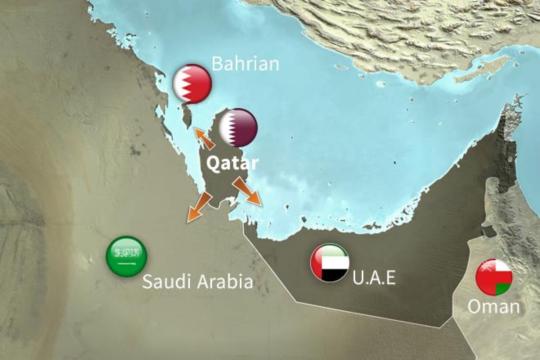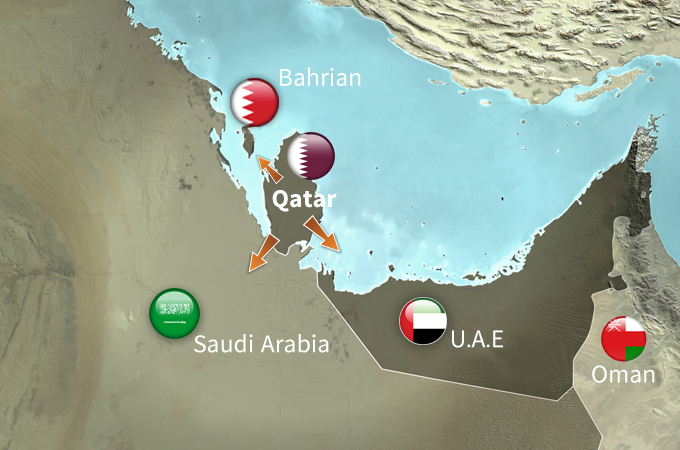
 |
|
[AlJazeera]
|
| Abstract The recent withdrawal of three Gulf Cooperation Council (GCC) country ambassadors from Doha creates an unusual diplomatic crisis, one which must be viewed in the context of socio-political developments in the region, particularly ongoing events in Egypt. Saudi Arabia, the United Arab Emirates (UAE) and Bahrain seek to curb the influence of impact of Qatar on core issues in the Middle East, particularly Egypt. Furthermore, Saudi Arabia and the UAE in particular are working to delegitimize the Arab Spring. This report predicts that the situation will likely continue in the same manner, particularly because Qatar is unlikely to change its foreign policy and Saudi Arabia will not waive its demands. One possible solution could be to draw a formula that satisfies all parties concerned; for example, through mediation led by Kuwait. However, it remains that the persistent underlying problem is a deep-rooted lack of confidence between the disputing parties which arises from vastly divergent policies leading to tension even before this latest incident. |
Introduction
On March 5, 2014, in an unprecedented move since the Gulf Cooperation Council’s (GCC) establishment more than 30 years ago, Saudi Arabia, the United Arab Emirates (UAE) and Bahrain withdrew their ambassadors from Doha. They explained in a jointly-issued statement that their decision arose because of Doha’s intervention in the internal affairs of the Gulf states, threatening their security and stability. This crisis must be examined in the context of regional developments, particularly ongoing events in Egypt. On July 3, 2013, a military coup led by Field Marshal Abdul Fattah El-Sisi toppled Egypt’s legitimately elected Muslim Brotherhood government despite the fact the Islamic movement had gained power through an election with broad participation from all segments of Egyptian society.
The actions by these three Gulf states indicate their desire to curb Qatar’s clear impact on vital issues in the Middle East, particularly Egypt. Furthermore, Saudi Arabia and the UAE are actively seeking to delegitimize the political effects of the Arab Spring revolutions.
Diplomatic rift amid regional variables
The reality and depth of the dispute between Qatar and Saudi Arabia and the UAE should be examined through the lens of influential strategic balances in the region. The military coup in Egypt which toppled Mohammed Morsi drew clear dividing lines, with Saudi and the UAE in support of the coup while Qatar and Turkey opposed it. The coup had several implications: it caused a serious political rift across the world between supporters and opponents of Sisi, contradicted democratic values by removing a legitimately-elected president, formed new alliances (which continue to evolve) and transformed the political map.
As certain regimes watched these events, they feared political change would soon reach their shores and thus implemented preventative measures to immunise themselves from similar calls for freedom. Saudi Arabia in particular opposes anything changing the regional balance of power, causing it to breathe a sigh of relief when the Egyptian military returned to power because it meant Saudi’s interests and alliances were once again in friendly hands.
The ambassadors’ withdrawals are only a continuation of a series of harmonised policy stances between Saudi Arabia, the UAE and Egypt post-coup, including classification of the Muslim Brotherhood as a terrorist organization, banning Hamas from activities in Egypt, and imprisonment of Qatari activist Mahmoud Al-Jeeda for seven years in the UAE.
Saudi Arabia sees the Muslim Brotherhood as a threat given its affinity with reformist Salafist inside Saudi calling for political change, the Muslim Brotherhood’s successes in Eygpt with Morsi, in Tunisia with the Nahda movement and in Turkey with the Justice and Development Party (AKP) and their conflicting views with the original Salafi movement that is closely aligned with the Saudi regime. All of this is an impetus for Riyadh and Abu Dhabi to contain and limit Qatar’s influence on international and regional actors. Saudi in particular seeks to renew its leadership in the Arab world after the fall of the region’s most powerful regimes, Egypt (2011) and Iraq (2003) as well as the deteriorating condition of Syria’s revolution.
Sovereign demands in a changing environment
This excerpt from the joint statement accuses Doha:
“of a lack of commitment to the principles that ensure non-interference in the internal affairs of any of the GCC countries, either directly or indirectly, including non-support to any organization or party aiming to threaten the security and stability of GCC countries, whether by direct security action, exercising political influence or supporting hostile media.”
Reportedly, major Saudi demands submitted to the Qatari government and leaked to the press included “closing Al Jazeera channel, closing research centres in Doha and handing over wanted activists.” While no direct reference was made in the public joint statement about the closure of Al Jazeera, the term “hostile media” refers indirectly to the media network which has continued its coverage of Egypt even after the military coup led by Sisi last July. Al Jazeera has not refrained from granting a voice and platform to all parties in the conflict, including the Muslim Brotherhood, something which is seen as incommensurate with the leanings of some of the Arab regimes in the region.
Furthermore, if true, Saudi and UAE demands to Qatar to hand over activists on its territory contradict the principle of state sovereignty enshrined in international public law. At any rate, withdrawing ambassadors has apparently not achieved the desired goal of forcing Qatar to cease its policy of supporting changes sweeping the Arab world.
It is worth nothing that Saudi Arabia and other actors had gambled on regime change in Qatar translating to foreign policy change. When Sheikh Hamad bin Khalifa Al-Thani handed power over to his son Sheikh Tamim on June 25, 2013, his son confirmed in his inaugural speech he would continue along the path set by his father, and Qatar has remained, in many respects, a haven for the oppressed. This has resulted in pressure by other regimes – pressure that has thus far proven futile but led to enough anger that these parties withdrew their ambassadors. Qatar’s response was muted – they did not respond by withdrawing their ambassadors as well but instead asserted that Qatar’s differences with its Gulf brethren were a result of regional issues rather than the GCC’s internal affairs.
This crisis could potentially have a profound effect on the performance of the GCC system because it has destabilised confidence among member states. Since the establishment of the regional bloc, Riyadh has sought to dominate the GCC although regional interactions have led to periodic shifts in the balance of power as well as in the conceptual underpinnings of the system. This perspective has inspired the small states within the GCC to reject Saudi Arabia’s attempts to dictate policy to them under the guise of “the elder sibling.” For example, Kuwait and Oman failed to follow in the footsteps of Riyadh, Abu Dhabi and Manama and did not withdraw their ambassadors from Doha. The position of these two countries indicates their rejection of Saudi Arabia’s leadership and highlights a real split in the GCC as well as its inability to take a unified decision on such matters.
Further complicating the matter is the outright rejection by Oman when Saudi recently proposed to turn the GCC into a real union, one which could boost Riyadh's quest for dominance in the Arabian Peninsula. From this the conclusion can be drawn that the current crisis will not lead to the isolation of Qatar in the foreseeable future, but may instead lead to rapprochement between Qatar and other GCC partners.
There is an alternative hypothesis about as well, one that indicates the diplomatic spat initiated by Saudi Arabia was no more than a cover-up for internal power struggles within the House of Saud. Given the poor health of Saudi King Abdullah bin Abdul Aziz Al-Saud and the possibility that Crown Prince Salman bin Abdul Aziz Al-Saud will be excluded from the succession on health grounds as well, it seems that a conflict regarding leadership succession will erupt. Within the Saudi royal family, an extremist faction translated literally from Arabic as “hawks” wields significant power and is represented by those who run the Interior Ministry and National Guard. Thus, a diplomatic crisis with Qatar given its capacity as a state which supports democratic change in the Arab World at this particular time may indicate a Saudi agenda aimed at influencing options within Saudi’s royal family with respect to its future king.
Predicted outcomes
• While the crisis may negatively impact the GCC’s future, Qatar will likely emerge more powerful because several GCC members view the withdrawals as contrary to the interests of peoples linked by deep kinship. Arab public opinion also sympathises with Doha’s support for peoples’ commitment to self-determination in ravaged countries including Egypt, Tunisia, Libya, Syria and Yemen.
• The GCC is already experiencing instability after Oman’s rejection of a Saudi proposal for a Gulf Union and withdrawal of any member state at this point will no doubt lead to further cracks and disintegration of the Cooperation.
• Polarisation within the GCC will harm attempts to enhance democracy in the Arab world and taint member states’ positive perceptions of successful experiences.
• America’s position has not leaned in favour of one party or the other, and US President Barack Obama did not attempt to interfere during his March 2014 visit to Riyadh. This is unsurprising given the US’ interests binding it to its allies in the region.
• Qatar will maintain its prominent role in all “political Islam” matters due to its good relations with proponents of this movement in Arab Spring countries.
• Saudi’s desire to draw Qatar under its influence stems from its will to form a united front against Iran, its eastern neighbour. Both Oman and Qatar resist this, preferring instead to maintain good relations with Iran despite its strained relationship with Saudi.
• Saudi and Qatari support for the Syrian opposition in the face of Assad’s regime remains identical. It is expected both countries will continue to provide financial and military support to their chosen parties within the Syrian opposition.
• Saudi and Qatar have already began to diverge on the Palestinian issue, particularly after Saudi listed the Muslim Brotherhood as a terrorist organization. This could complicate its cooperation with Hamas, the Islamic resistance movement which has controlled the Gaza Strip since summer 2007. Qatar, on the other hand, has maintained good relations with all Palestinian parties in Gaza and Ramallah, allowing it to play a mediator role in any future reconciliation given that mediation is a key determinant of Qatar’s foreign policy according to Article Seven of the Qatari constitution.
Conclusion
One possible scenario could be an escalation of Qatar’s diplomatic isolation by Saudi Arabia and its allies via continued demonisation of Qatar’s role. However, the likelihood that such demonisation will succeed is poor given the Gulf States’ geographic proximity and the family cohesion of their peoples forms somewhat of a safeguard against this demonisation.
The other possible scenario could be a continuation of the current situation for a limited period of time. It is unlikely Qatar will change its foreign policy or its stated positions. On the other hand, Saudi Arabia will not waive its demands. Consequently, this crisis may only be resolved by reaching consensus on a formula that will satisfy all parties; for example, through mediation such as that led by Kuwait in its capacity as the head of the March 2014 Arab League summit. The profound and persistent problematic issue is a deep-rooted lack of confidence generated among the parties as a result of their vastly divergent policies, leading to tensions between them that have escalated to the level of this latest crisis.
_________________________________________________________
Copyright © 2014 Al Jazeera Center for Studies, All rights reserved.
* Dr. Jamal Abdullah is a researcher at the Al Jazeera Centre for Studies specialising in Gulf studies.